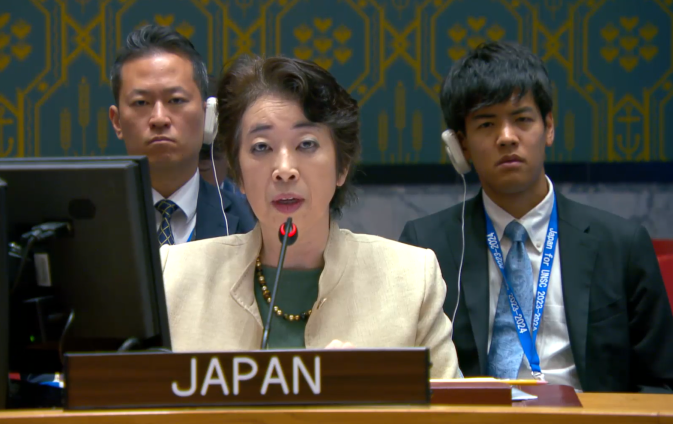パレスチナ問題を含む中東情勢に関する安保理ブリーフィングにおける志野大使ステートメント
令和6年7月26日

(As delivered)
Thank you, Mr. President.
I also thank UNRWA Deputy Commissioner-General De Meo, and Resident and Humanitarian Coordinator Hadi for their sobering briefings.
Nearly 10 months ago, this conflict began with the reprehensible terror attack on Israel by Hamas and other militant groups.
Japan once again unequivocally condemns the attack and the taking of hostages, more than a hundred of whom are still unable to return to their home.
However, since then, the relentless fighting has brought Gaza to a state where life is barely tenable, with too many civilian deaths and injuries, mostly women and children.
Desperate Palestinians are facing acute food insecurity, if not famine, and are left searching for the most basic essentials: safe drinking water, basic sanitation, medical care, and shelter.
We are extremely worried by the detection of cholera and polio in Gaza, which poses a grave risk of spreading due to the breakdown of the water and sanitation systems.
Furthermore, Israel’s repeated evacuation orders have forced nearly 1.9 million to relocate, many multiple times.
Japan is appalled by the heavy civilian casualties caused by the ongoing hostilities, including the IDF’s new miliary offensive in Khan Younis, which reportedly killed dozens and forced thousands to flee.
The reduction in the size of the so-called “humanitarian zone” in Al-Mawasi is deeply troubling.
These recent events demonstrate even more clearly that there is no safe place in Gaza, and we reiterate the urgent need for all parties to strictly abide by international law including international humanitarian law, especially the protection of civilians.
A prompt and extensive delivery of humanitarian aid is essential, yet the Rafah crossing has remained closed since early May.
It should be reopened immediately.
Japan commends the humanitarian aid workers who are bravely working under dangerous environments, and we call for their safety to be ensured.
But the breakdown in public order creates enormous challenges for their life-saving work.
The role of UNRWA is vital and, as Secretary-General Guterres has stated, nothing can replace it.
Yet since the conflict began nearly 200 of its staff have been killed and nearly 200 of its premises have been damaged or destroyed.
This is unacceptable.
We are also concerned about a number of proposed measures that may disturb UNRWA’s activities.
The only viable solution to stop this ongoing horror is the three-stage ceasefire proposal endorsed as UN Security Council resolution 2735.
Japan amplifies our call for all parties concerned to steadily work toward the release of all hostages and a sustainable ceasefire, as well as the safe and effective distribution of humanitarian assistance at scale throughout the Gaza.
We reiterate our strong support for the painstaking diplomatic efforts led by the United States, Egypt, and Qatar to that end.
Once a ceasefire is realized, the international community will have to help rebuild Gaza and restore a political horizon for a two-state solution, which is the only path that can finally bring peace for Israelis and Palestinians.
I thank you.
I also thank UNRWA Deputy Commissioner-General De Meo, and Resident and Humanitarian Coordinator Hadi for their sobering briefings.
Nearly 10 months ago, this conflict began with the reprehensible terror attack on Israel by Hamas and other militant groups.
Japan once again unequivocally condemns the attack and the taking of hostages, more than a hundred of whom are still unable to return to their home.
However, since then, the relentless fighting has brought Gaza to a state where life is barely tenable, with too many civilian deaths and injuries, mostly women and children.
Desperate Palestinians are facing acute food insecurity, if not famine, and are left searching for the most basic essentials: safe drinking water, basic sanitation, medical care, and shelter.
We are extremely worried by the detection of cholera and polio in Gaza, which poses a grave risk of spreading due to the breakdown of the water and sanitation systems.
Furthermore, Israel’s repeated evacuation orders have forced nearly 1.9 million to relocate, many multiple times.
Japan is appalled by the heavy civilian casualties caused by the ongoing hostilities, including the IDF’s new miliary offensive in Khan Younis, which reportedly killed dozens and forced thousands to flee.
The reduction in the size of the so-called “humanitarian zone” in Al-Mawasi is deeply troubling.
These recent events demonstrate even more clearly that there is no safe place in Gaza, and we reiterate the urgent need for all parties to strictly abide by international law including international humanitarian law, especially the protection of civilians.
A prompt and extensive delivery of humanitarian aid is essential, yet the Rafah crossing has remained closed since early May.
It should be reopened immediately.
Japan commends the humanitarian aid workers who are bravely working under dangerous environments, and we call for their safety to be ensured.
But the breakdown in public order creates enormous challenges for their life-saving work.
The role of UNRWA is vital and, as Secretary-General Guterres has stated, nothing can replace it.
Yet since the conflict began nearly 200 of its staff have been killed and nearly 200 of its premises have been damaged or destroyed.
This is unacceptable.
We are also concerned about a number of proposed measures that may disturb UNRWA’s activities.
The only viable solution to stop this ongoing horror is the three-stage ceasefire proposal endorsed as UN Security Council resolution 2735.
Japan amplifies our call for all parties concerned to steadily work toward the release of all hostages and a sustainable ceasefire, as well as the safe and effective distribution of humanitarian assistance at scale throughout the Gaza.
We reiterate our strong support for the painstaking diplomatic efforts led by the United States, Egypt, and Qatar to that end.
Once a ceasefire is realized, the international community will have to help rebuild Gaza and restore a political horizon for a two-state solution, which is the only path that can finally bring peace for Israelis and Palestinians.
I thank you.
